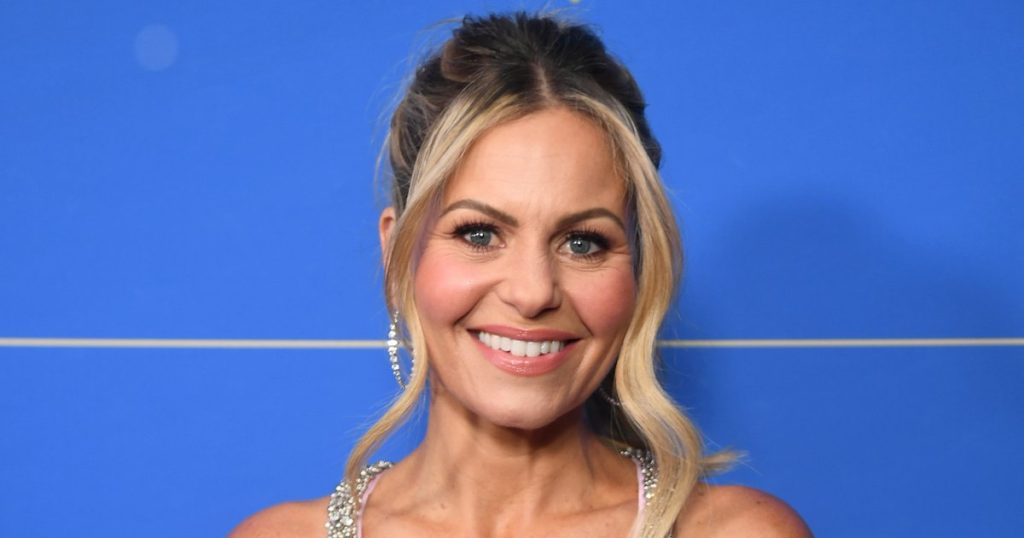Candace Cameron Bure’s Ongoing Journey with Body Image and Social Media Scrutiny
In a recent and revealing social media moment, Candace Cameron Bure, the beloved “Full House” actress, made the difficult decision to remove a swimsuit photo from her Instagram after it attracted an overwhelming flood of comments focused on her physical appearance. “I was at the beach, [and] I was wearing a one-piece,” the 49-year-old actress explained in her Instagram Stories. “I am soaking up the end of summer. I was having fun.” What had begun as a simple celebration of summer’s end quickly transformed into something much more complicated as commenters began dissecting her body rather than appreciating the moment she was sharing. Cameron Bure made the conscious choice to delete the post, stating simply, “It wasn’t worth it.” This incident serves as a poignant reminder of the intense scrutiny public figures face regarding their bodies, and how social media can quickly transform innocent posts into forums for unwanted commentary about physical appearance.
What makes this situation particularly sensitive is Cameron Bure’s candid history with body image struggles. On a July episode of her podcast, she bravely revealed her ongoing battle with bulimia, which began when she was 18 years old. “I still say I’m a bulimic because the thoughts, whether I’m doing that or not, never leave me,” she shared with remarkable honesty. Despite nearly three decades having passed since the onset of her eating disorder, Cameron Bure admitted that she still needs to actively employ coping mechanisms to maintain her health. Her vulnerability is striking as she questions why, at 49, these thoughts continue to consume her: “Why do I think about this so much? Why does it even matter so much? It’s so ridiculous, and yet, I’m still thinking about it.” Her willingness to share these deeply personal struggles resonates with countless individuals who silently battle similar demons, offering them a voice and validation that they aren’t alone in their ongoing journey toward self-acceptance.
The roots of Cameron Bure’s body image issues trace back to her early years in the entertainment industry, where the pressure to maintain a certain appearance began during her formative years. She revealed that she was first introduced to dieting alongside her mother and sisters as a preventative measure – not because she needed to lose weight, but to establish healthy habits before potential industry pressures emerged. “That completely shattered the viewpoint that I had about myself,” Cameron Bure explained, noting how this well-intentioned approach inadvertently planted seeds of body consciousness. Her parents were trying to protect her from the potential trauma of having producers comment on her weight, yet these early interventions fundamentally altered her relationship with her body. This revelation highlights the complex dynamics young performers face in an industry where physical appearance is constantly scrutinized, and how even protective measures can sometimes inadvertently contribute to lifelong struggles with body image.
Cameron Bure’s current quest for healing demonstrates both her determination and the persistent challenge of overcoming deeply ingrained body image issues. “I’m reading everything I can. I want all the information,” she shared, expressing her commitment to finding effective solutions. While she acknowledges finding useful tools along her journey, she candidly admits that nothing has completely transformed her fundamental relationship with her body: “There’s still nothing that has really changed my heart and soul on it.” This ongoing search for healing illustrates the persistent nature of eating disorders and body image issues, which often require lifelong management rather than offering a definitive cure. Her openness about this continuous struggle provides an important counternarrative to the often oversimplified “recovery stories” portrayed in media, acknowledging instead that healing is rarely linear and often continues throughout one’s life.
The intersection of Cameron Bure’s personal struggle with the public nature of social media creates a particularly challenging landscape for her to navigate. While social platforms offer celebrities direct connection with fans, they simultaneously expose them to unfiltered commentary about their appearances. The recent swimsuit photo incident demonstrates how quickly a joyful moment can be overshadowed by unwanted focus on physical appearance. For someone with a history of eating disorders, such comments can be not merely annoying but potentially triggering. Her decision to remove the photo represents a healthy boundary-setting behavior – recognizing when a situation threatens her well-being and taking action to protect herself. This conscious choice demonstrates the complex balancing act public figures must maintain between authentic sharing and self-preservation in an era where the line between public and private has become increasingly blurred.
Cameron Bure’s willingness to share her ongoing struggles offers a valuable service to others battling similar issues. By speaking openly about her experiences as a successful actress still grappling with body image concerns at 49, she helps normalize these conversations and reduces the isolation many feel when facing such challenges. Her candor creates space for others to acknowledge their own struggles without shame, potentially encouraging them to seek support. As eating disorders continue to affect millions across age groups and demographics, personal stories from public figures help combat stigma and misconception. For those inspired by Cameron Bure’s journey who may be struggling with similar issues, resources like the National Alliance for Eating Disorders provide crucial support through their website and 24/7 hotline at +1 (866) 662-1235, or by texting “ALLIANCE” to 741741. Her story reminds us that behind polished public images often lie complex, ongoing personal battles, and that vulnerability and authenticity can be powerful tools for both personal healing and creating meaningful connections with others facing similar challenges.


